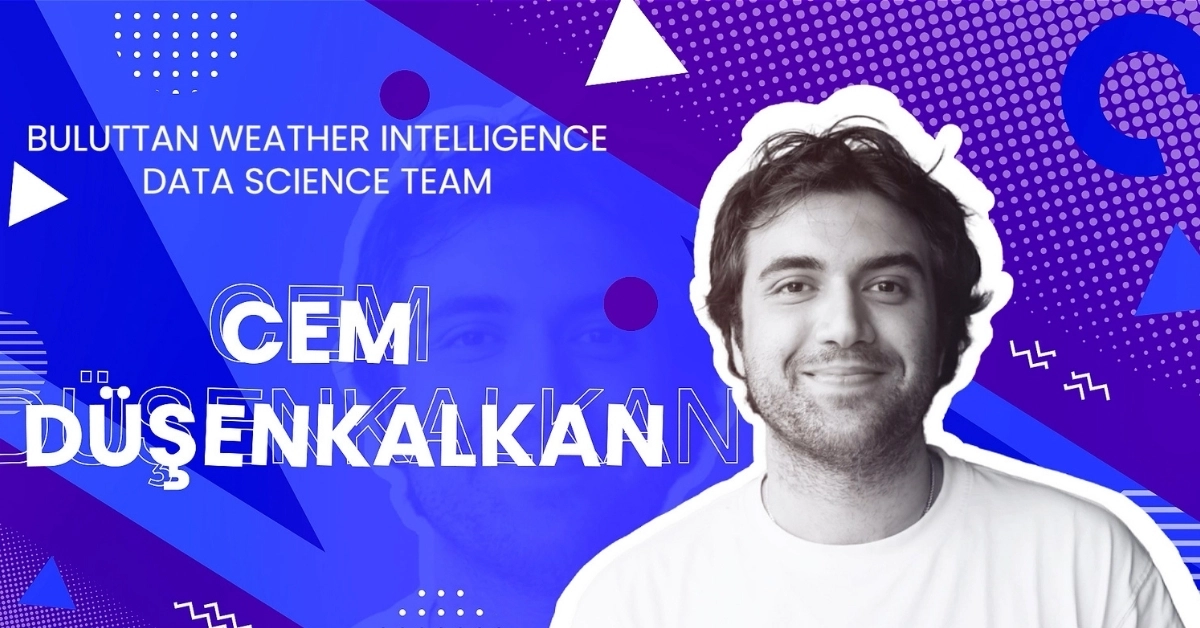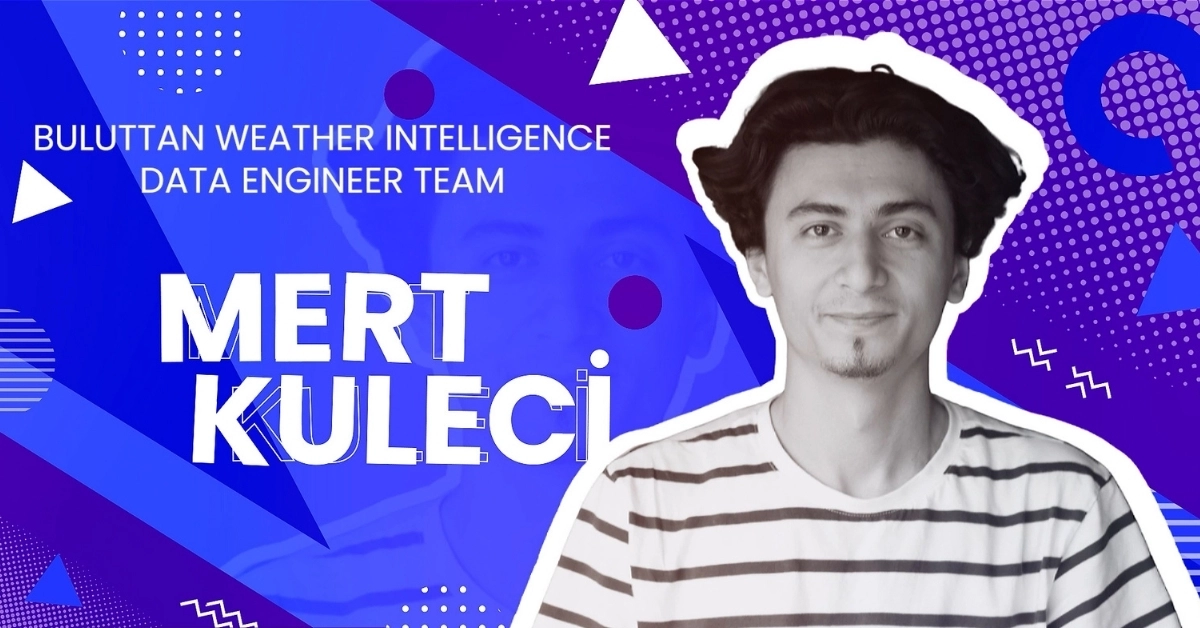Today at Buluttan Small Talks, we are with Tansylu Akhmetova, currently an intern in Buluttan's Data Science team and a Computer Science student at Sabancı University. While hearing her advice for those without a background in meteorology about Buluttan, we also discussed the importance of data in this field.
Gökmen: Hello. Today we are here with Tansylu.
Tansylu: Hi everyone.
Gökmen: Welcome. How are you?
Tansylu: I'm good. How are you?
Gökmen: Good, good, thank you. Let's start with the most desired question. What does Tansylu mean?
Tansylu: Tansylu means sunrise beauty in Tatar language.
Gökmen: Very nice. So let's start with knowing you further in terms of what you deal with, in terms of your personality, in terms of maybe extracurricular activities that you pursue. So who is Tansylu?
Tansylu: Tansylu is a computer science student, first of all. I'm in my final year right now in undergraduate Sabancı University. Starting this summer, I am working at Buluttan in the data science department. I came to Turkey four years ago. This has been a journey for me and this has been my first permanent job in Turkey. And it's been really interesting to see how it works here and to meet a Turkish team and to see how I can integrate into this culture and the community.
Gökmen: You did a pretty good job in terms of speaking in the Turkish language as well as getting adapted to the culture. You've been traveling to Turkey before you moved or this is the first time you just showed up here?
Tansylu: The first time I came to Turkey, I immigrated to Turkey. So it was kind of a sudden move. I learned Turkish in two years before university and then I started university.
Gökmen: Perfect. What do you do here?
Tansylu: Right now I'm working in the data science department on a wind energy project. We deal with the prediction of wind energy production. So what we do is we take weather data, the WRF outputs from our meteorology team and we enhance it using machine learning to produce wind speed to power production estimations.
Gökmen: And you are doing a great job in the team. So as we see, the decrease in the MAEs (Mean Absolute Error) is going very well. Thanks for that. How did you come up with the idea of working for a firm that focuses on weather intelligence? Or you just bumped into Buluttan? What was the first meeting?
Tansylu: It was actually very interesting. So last semester I was on exchange in Sweden and I was walking in Stockholm doing some souvenir shopping. Suddenly I got a call from Güven, the CTO here. He just started explaining what Buluttan is. And I was shocked for a second. I was like, what is going on? Then I got to know Buluttan better. And I was really excited about the opportunity because it seemed like one of the rare companies that actually have tangible data, something really specific that they work on and a specific industry as opposed to other companies that I applied was. They were very vague. Especially the data roles. They do not explain exactly what you're doing. So that's how I joined Buluttan through a couple of interviews after that phone call.
Gökmen: Great. You spend most of your time with data science. How do you see weather intelligence in terms of a data science perspective? I mean we are dealing with a huge amount of data and it is a variety of data concerning the channels, different observations, and different forecast methodologies. So how do you see it in terms of a data science perspective?
Tansylu: I think it's a very exciting domain because as you said, there is so much data and there is so much that can be done. So we are currently setting up a system that will allow us to do a lot of experiments really fast. So there's a lot to experiment with, a lot to learn, and a lot to try and see the results. Yeah, we are working towards improving the error rates on wind speed predictions and it's looking promising.
Gökmen: How do you see it in Buluttan, in the scope of weather intelligence and the scope of the Turkish ecosystem as a startup?
Tansylu: I think Buluttan has a very innovative approach because it's very industry-specific and you apply general weather predictions to very specific cases. Once I got immersed in it, it was easy and smooth, and yeah, I would say Buluttan is very innovative. That's what I could see.
Gökmen: It's good to hear that because I mean, there has been a recently started paradigm shift, as you might have already noticed or heard in weather intelligence, the more proprietary data, the more observations you have, the more precise you can be, as you know. So we are just the in-game of collecting data as well as interpreting it, validating it, and making it useful for data science as well as meteorology teams. So we are in the stage of globalization, we are going abroad, extending our services in Turkey as well, and we are focusing on different sectors.
Gökmen: How do you see the international culture as a Turkish startup here? Did you have any, let's say, difficulties or did you have any ease of access as a recent joiner, sort of to some extent international, but also a Turkish resident student who speaks both languages or a couple of languages at the same time? How do you see it and what can you recommend for the ones who are trying to or who are aiming to apply for Buluttan for future times?
Tansylu: I would say that I was pleasantly surprised when I joined Buluttan. Everyone here actually speaks English. It's very comfortable for me because I'm more comfortable talking and presenting in English and it's a very inclusive atmosphere. Everyone is friendly and I don't notice the differences as much. For any international people seeking to join this company, I would encourage them because I think this company is really trying to reach a global audience, so it's always useful. It's always good to have international teams.
Gökmen: Perfect. What can you say about non-meteorological engineers? What can you recommend them if they have some interest in weather intelligence or climate modeling already or tend to be working for such industries, such areas, what can you say to them?
Tansylu: It starts with curiosity. As long as you have curiosity towards the weather domain, it's possible to find sources and research on your own. Also what I did, I spent the first time here learning about the energy domain and what all of these mean, and how these weather forecasts are applied to industry. All the information is available online. Especially, Buluttan is also doing a good job informing people through our channels. So I'd suggest staying curious and looking it up.
Gökmen: Perfect. So for the ones who are aiming to apply here or who think he can or she can bring value to weather intelligence, we are encouraging those who apply to Buluttan and take a chance for an interview maybe. And I always say "Havanız yerinde olsun! (May your weather be good!) for the ones who are seeking for better weather on the 1 October.
Tansylu: Havanız yerinde olsun!







